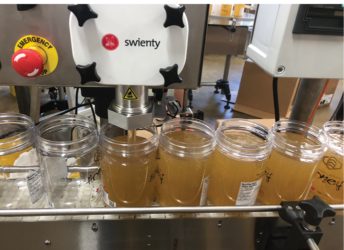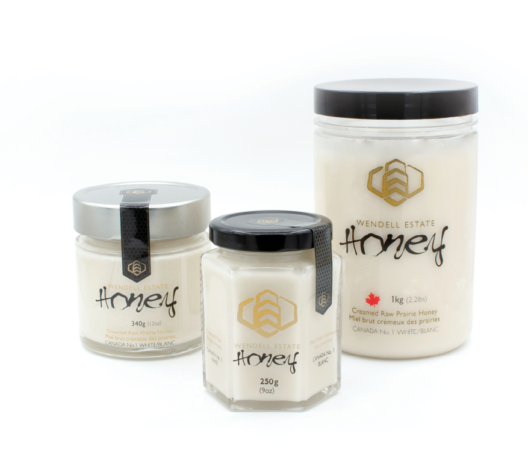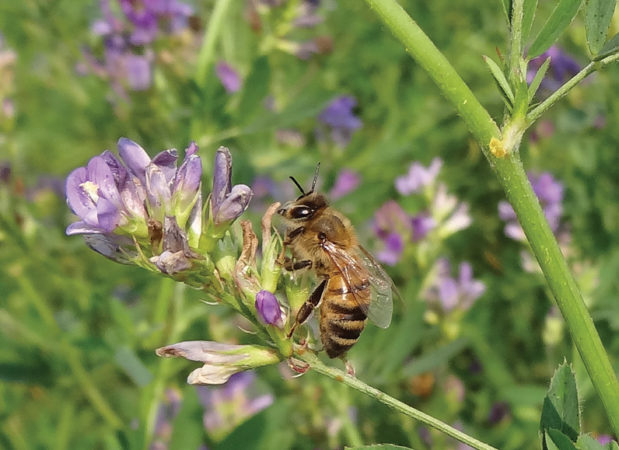
Hard-earned success
Food in Canada
Food In Canada honey tradeHow Wendell Estate Honey is marketing its premium Canadian honey to consumers at home and abroad

By Treena Hein
A good way for a company to differentiate itself in any market is to produce a premium product. But because so many others may have the same idea — or follow your company’s lead — you have to market your premium product with care, and keep at it.
Wendell Estate Honey in Roblin, Man. has accomplished this feat in Canada and around the world, even in the ultra-competitive Chinese market. The family-run business began in the early 1940s with John Wendell, who founded Wendell Honey. Over the years, he grew the farm business and sold in local markets. Now, the farm property houses over 3,500 beehives. In charge of all this humming activity is and John and Alvera’s son Tim and his wife Isabel. In turn, their sons Jeremy (along with his wife Carol) and Nathan are responsible for business development and production and sales, respectively.
It was a little before 2011 that Tim and Isabel, along with Martin Neuhofer (their honey house manager at the time), got to thinking about the lack of raw “from the farm” honey readily available on the market. Every year, they had dedicated customers stopping by to pick it up, so the demand was there. The three of them thought about how this honey could be marketed to the general public, explains Jeremy, “so that people who lacked convenient access to a trusted local honey producer could still enjoy genuine fresh farm honey.” Wendell also still sells its regular honey as well.
They marketed their very finest raw product in 2011 as a premium brand called Wendell Estate Honey. It’s now sold in Canada, the U.S. and several Asian countries, enclosed in high-end imported European glass jars of various sizes (and in 2016, they also added one kilogram plastic tubs to the lineup for big fans). In late 2018, the business also launched Wendell Estate Organic Honey, sourced from a remote partner farm in northern Saskatchewan.

“Sales have been better than expected,” Jeremy Wendell said. “Genuine organic honey is a rare find. Bees forage… easily travelling three kilometres to reach a good nectar source. Regardless of beekeeping practices, if any farmer seeds any of the crops proscribed by the Canadian Organic Regime within three kilometres of the beehives, the honey… does not qualify as organic.”
China adventures
For its hard-earned success in China, where fraudulent white honey abounds, Wendell Estate Honey recently won a Jury’s Choice Alizé Award (formerly the Canadian Export Business of the Year Awards). At first, moving into that market was pretty much effortless.
“The market was already there waiting, and we just provided a quality product that wasn’t yet available,” Wendell explains. “China has a deep food culture and specifically a strong honey culture. Many Chinese people drink honey in warm water daily as a health supplement, and [many] are sophisticated honey consumers. Even in a smaller, lower-price supermarket chain in China, you’ll see 20 varieties of honey on the shelf. Our honey has a fresh, delicate taste and uniquely smooth texture, which appeals to the sophisticated Chinese palate.”
In addition to meeting demand for high quality, Wendell Estate Honey also addressed a demand among Chinese consumers for authenticity and traceability. Adulterated or downright fake food products abound in China, and sometimes, beekeeping practices in China and elsewhere, says Wendell, can involve giving sugar syrup to bees and the use of banned antibiotics. This honey is often exported as well; in early July this year, surveillance by the Canadian Food Inspection Agency (CFIA) prevented adulterated honey of unspecified origin, valued at close to $77,000, from entering the Canadian market. Wendell says the fact that he and his family members are involved in the entire beekeeping and honey production and packaging process is a “huge” selling point.
“Our own marketing efforts, and those of our retail partners, really stress the fact that our honey all comes from our farm,” he says, “and that there is no opportunity for any third party to adulterate the honey.” He adds that Canada’s “thorough and well-respected regulatory environment add to the reputation of Canadian honeys as being pure, authentic and safe.”
In addition, their traceability is top-notch. All product can be traced by date of packaging and back to the individual apiaries (bee yards) it hailed from. “That gives us some idea of the ‘floral composition’ of the honey,” Wendell says. “When pushed for a floral description, I like to call it ‘prairie blossom,’ which will include clover, canola, alfalfa and lesser amounts of whatever pasture and wild-flowers that happen to be in blossom.”
Traceability, food safety, quality and health benefits have all been important in marketing Wendell Estate Honey in China, but in Japan for example, it’s a little different. There, Wendell explains, “we shift the emphasis more to our family’s 80-year-plus experience and the unique flavour and texture. Each market is completely different. It is interesting to learn about the honey culture in each new market (South Korea, Taiwan, and Singapore) and to work on tweaking our marketing to suit the local culture while retaining our core values and brand image.”
The export journey
However, their export journey in China was not all roses. Wendell Estate Honey hit some major bumps in the road, along with some appalling twists and turns. The company faced a serious brand crisis in China in 2017-18.
“In the years leading up to 2017, our sales were growing rapidly in China due to the quality and uniqueness of our honey and the fact that there were no comparable Canadian honeys for sale in China. Of course, our moderate success creating a new niche in the China honey market didn’t go unnoticed and Canadian-based honey companies sprang up offering a product that was similar to our honey, at least in outward appearance. Some of these companies are Chinese-owned, had a natural understanding of the Chinese consumer, and had good connections with markets in China,” said Wendell.

Of these “new” Canadian white honeys, Wendell said the company felt there was no comparison to its product. “They are blended honeys that would usually be purchased in bulk, generally in a crystallized state. The honey would then need to be heated to transfer into the bottling facilities, creamed using the Dyce method and then bottled. Alternatively, some of it seems to be coarsely-granulated honey that was ground using a machine to improve the texture. It is difficult to tell with limited information available on the competition, but most appear to be packaging companies rather than primary producers.”
Wendell said that while it is likely that most of the honeys are genuine, pure Canadian honey, they are produced using cheaper techniques and cheaper honey sourced from various producers.
Simultaneous with the increasing competition of similar-looking honey at discount prices was the phenomenon that in 2016 and 2017 the large customers of Wendell Estate Honey were Chinese-owned, Canadian-based logistics companies shipping to China, he said. “These logistics companies had noticed that Wendell Estate Honey was a popular Canadian product in China so they purchased large volumes of our honey. These logistic companies are closely affiliated with networks of ‘daigou’ (‘representative buyer’) shoppers and online China retailers.”
China has well-developed direct sales channels for foreign goods. According to Wendell, “daigou” works like this: A consumer in mainland China will search online for a foreign product, often on the Taobao platform (similar to Amazon in the west, but bigger in scale). Online shops will sell the foreign product and contact their “buyer” in the foreign country. The buyer will then physically purchase the product at a retail outlet (like Costco or clothing outlet mall etc.) and mail it to the consumer in China, avoiding import duties and other fees.
“What the logistics companies do is set up their own online retail outlets on Taobao, WeChat or other platforms in mainland China and fill daigou orders directly from their own supply. The logistics companies generate their profit by the logistics fees, not from product markup and they do no marketing at all. They simply see what products are popular (since they are often the shippers for individual daigou purchasers they have their own databases of which goods are moving between Canada and China) and fill their boxes with whatever goods are popular. We had no idea that this is what was happening with our honey.”
Unfortunately, many of the logistics companies neglected to store the honey properly, resulting in the honey gradually darkening from it’s initial striking white colour to a darker, more common, yellow colour. “Some honey even fermented while stored in hot damp warehouses for months at a time,” he said.
“With no markup on the honey itself, and very minimal costs of warehouse storage and online shop with no marketing, the logistics/daigou companies were selling our honey very cheaply, sometimes at even lower prices than we can sell in Canada. Even worse, some were dumping fermented honey for whatever little bit of money they could recoup (of course, not advertising it as fermented). The combination of bargain basement pricing, no duty, occasional sales of spoiled product, no marketing/customer education and new competition from other Canadian brands that looked similar hurt the Wendell Estate brand, caused problems for our legitimate China importers who have the expenses of duty and marketing and decreased demand for our honey.”
In 2018 and 2019, Wendell Estate Honey worked hard to restore its brand image in China.
Wendell’s wife, Carol Ye Min, is originally from China and has been “invaluable” in investigating the daigou sales channels, and educating our re-sale customers on the importance of proper storage to maintain the premium quality of the honey, marketing the honey in accordance with our values of honesty and transparency and retailing the honey for at a price that supports sustainability for the vendor, he said. “We have also worked hard in forming new partnerships with large-volume purchasers that we could trust to respect and properly represent our family brand.”
All this work was worth it.
“Indications are that these efforts have paid off: current online prices in China reflect sustainable vendor profits accounting for the costs of proper storage, marketing and customer service while sales volumes on the larger platforms are up substantially compared to mid-2018 when prices and brand image were at a low point.”
Convincingly worth the price
Marketing premium honey isn’t without challenges in Canada as well. The biggest challenge, said Wendell, is convincing retailers that the market for it exists, and “that our honey is actually different from the honeys they currently retail. When speaking with potential retailers there is often resistance to offering honey at our price point. I am often told that ‘our customers will not pay that much for honey.’ However, our own experience has been quite different.” He points out that of the more than 70 individual shops that have retailed Wendell Estate Honey in Canada, only two have stopped selling it because they found it to be too expensive for their customers.
“Our local co-op grocery store sells over a thousand kilograms per year of Wendell Estate Honey, despite our honey being on the shelf next to a much lower-priced honey that is also local,” he adds. “Roblin is not a high-income area.”
Moving forward, the Wendell’s are really excited about expanding our sales into Japan and into the U.S. and also to increase Wendell Estate Honey availability in Canada, especially on the East and West Coast where few people have heard about or tried it.
“We have new retail and distributor partners in China and Japan that are doing excellent work marketing our honey and educating consumers about what makes [our product] unique,” says Wendell. “We are also about to launch a greatly-expanded new website and e-store, with recipes and a new section on honey health benefits.”
Fighting fraud
However, the Wendell’s share the concern of other honey producers in Canada and beyond that, adulterated honey is a serious business threat. While they and others, such as Worker Bee Honey Company in Chilliwack, B.C. are certainly fighting back, the situation is dire.
In January, Worker Bee opened a new cutting-edge lab to detect fake honey. In an article published by the Columbia Valley Pioneer, Peter Awram, owner of the Worker Bee Honey, said that the lab (which employs Canada’s only nuclear magnetic resonance machine) “is a response to honey adulteration, a worldwide problem which is growing larger.” The agriculture minister for British Columbia states in the same story that the public trust is at stake, and for B.C. honey producers to use the “Buy B.C.” logo in future, the lab testing could serve as a verification method. 
Print this page